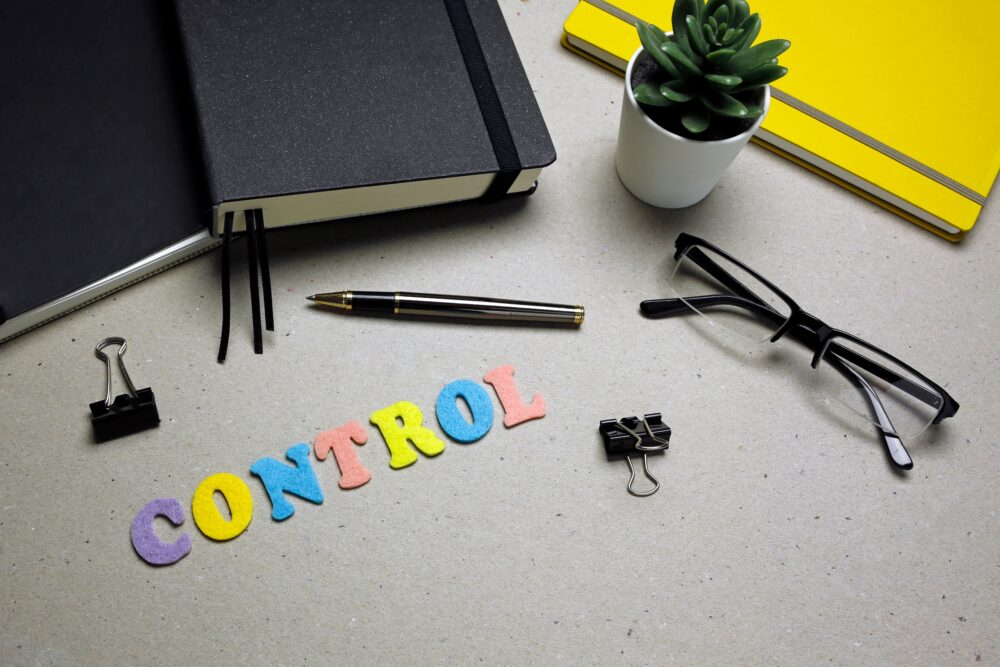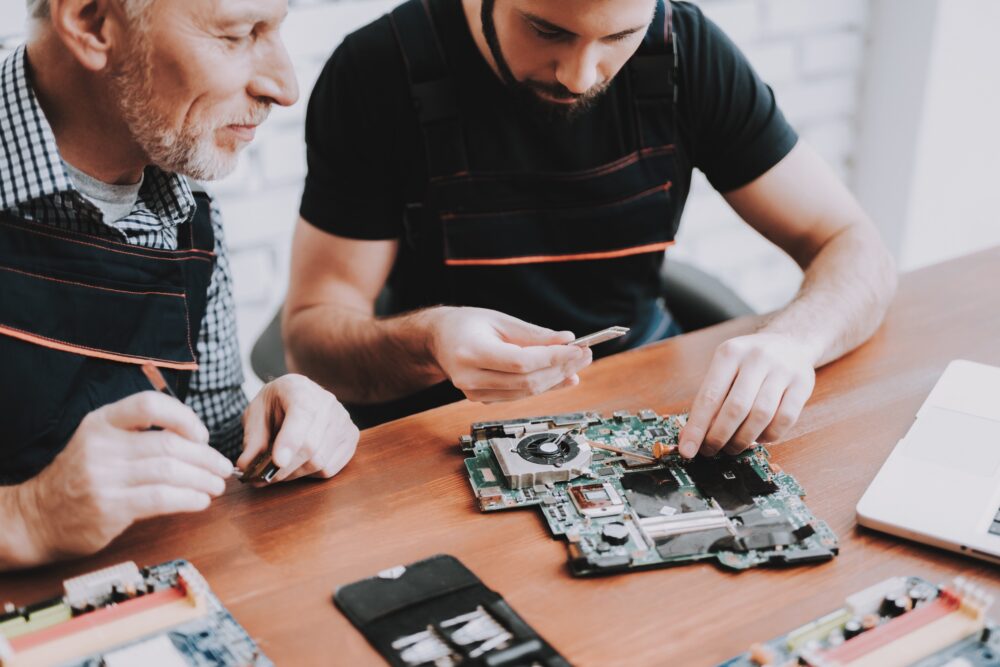
A couple of weeks ago, I wrote about how spending like there’s no tomorrow in order to feel a sense of control is a poor strategy. Any sense of control you feel by upgrading your bathroom, having a big wedding, or buying whatever catches your eye is only an illusion of control. Sure, you may feel, in that one moment, like you’re in control of something in an otherwise out of control world, but that feeling will fade. When it does, you’re going to spend again and again to try to replicate that feeling. This leads to increasing financial difficulties over time. The more stress you feel, the more you spend and it becomes a never-ending cycle.
Instead of spending on random stuff that only gives you an illusion of control, why not engage in activities that actually do help to bring your corner of the world under control? Sure, you can’t fix the world, but you can do things that make your personal life less of a dumpster fire. And really, that’s all any of us can hope for since we can’t personally fix many of the larger problems.
If you’re looking for a sense of control, try a few of these activities. Most of them are free. Even if you do need to spend a little money to accomplish them, at least it’s money spent in the pursuit of a solid goal instead of wasted on a frivolous whim.
Prepare
I’m not saying you need to go nuts and build a bunker and fill it with enough food, guns, and ammo to outlast the end of the world. However, preparing for some emergencies just makes good sense. Having an emergency kit with flashlights, a radio, medication, non-perishable food, some cash, pet food, and water just makes sense in most places. Even if you don’t keep a go-bag packed, you should know exactly what should go in it, and be ready to pack on a moment’s notice if you’re told to evacuate. Also know where you’ll go in an evacuation (and what you’ll do with pets, if applicable). Family? Friends? A shelter? A hotel a long way away?
Most places see some risk from storms, wildfires, or random power outages. Knowing what your area is likely to face and prepping for it ahead of time is a step toward feeling in control. (Most local governments keep lists of suggested emergency items somewhere on their websites so if you’re new to an area, that’s a good place to look for ideas.) You can’t stop the event, but you can control your response to it.
Protect
Taking steps to protect yourself and loved ones from catastrophe is always a good idea. Carry proper insurance. Have a will and health directives in place. Keep your home safe with things like smoke/carbon monoxide detectors and fire extinguishers. Get burglar alarms if you think you need them. (At least lock home and car doors.) Keep copies of important documents or pictures offsite/online so that if your house burns down, you have stuff stored somewhere else. Take precautions to protect your home and vehicles against the weather. Trim trees that might come down in wind or ice, keep your garage clear so you can park cars in it during a hail storm, or install landscaping that acts as a fire barrier, for example. You may not be able to prevent every event from happening, but proper protection can mitigate the damage done to your life.
Clean something
Cleaning is a productive way to feel more in control. When you start with a cruddy mess and end up with a sparkling shine, you feel like you really accomplished something. And you don’t have to do a whole room or home to get that feeling. Just dealing with the mildew in the shower or the pile of laundry in the floor is a great step forward.
Declutter
Choosing to keep certain things while getting rid of others is, by its very nature, an act of control. You are making conscious decisions about what is valuable in your life, and what is junk. You’re deciding what kind of environment you want to live in. If you donate the unwanted (but still useful) stuff to a worthy organization, you also get to feel good about yourself.
Tackle the to-do list
Everyone has a long list of stuff that needs to be done, but many of us procrastinate until the list feels insurmountable. There’s always something more important or fun to do, or so we tell ourselves. Knocking items off that list is a great way to feel like you’re in charge of your life. You’re getting stuff done!

Repair something
There’s always something around the house (or lots of somethings) that need just a little repair. We keep telling ourselves we’ll sew on that button, patch and repaint the ding in the wall, or fix the wobbly chair. Yet we never quite get there. Gather up all the stuff that needs fixing and get to work. Restoring things to their full functionality is a great way to feel in control.
Tackle the overflowing hobby pile
You’ve let the to-be-read pile get out of control. (Or the pile of Lego models to be built, games to be played, yarn to be knitted, canvases to be painted, puzzles to be put together, wood to be carved, etc.) Whatever your hobby is, if you’ve let the undone projects and unused supplies pile up, take the time to work your way through them. You’ve already paid for the stuff, so no more spending is needed. Seeing the pile get smaller means your’e bringing it under control. Bonus: You get to have fun doing all the things you’ve been meaning to do, and it should take your mind off the rest of the world for a while.
Take care of a put-off appointment
We all put off going to the doctor, seeing the lawyer for needed estate documents, returning important calls, or other unpleasant activities. Well, it’s time to make that call and set up the appointment (and then keep it). Things like these tend to get worse with time. (Or at least they don’t go away when ignored.) Dealing with them promptly keeps your health and wealth under control and gives you a feeling of empowerment.
Cook something
Feeding ourselves and our families is a very primitive form of control. We all have to eat, after all, and providing for basic needs satisfies our instinct to care for ourselves and our loved ones. Cooking doesn’t cost very much, can be relaxing or social, and learning new recipes is good for the brain. Even if you just bake brownies, you’re taking some control over your life.
Exercise
Exercise is good for us in so many ways. It eases stress and keeps us healthy. It can be social if you run together or engage in a team sport. Learning new moves or getting better at a sport is good for your brain. Taking charge of your health and wellness is an act of control. (And you don’t need a pricey gym membership. You can work out at home or the local park.)

Learn something
Taking charge of your knowledge is an act of control. You may want to learn about the things that worry you so you can better understand and prepare for them. Perhaps you want a deep dive into politics, climate, or the histories of global conflicts. Or you may want to learn new languages, math, science, history, or some other field. You may just want to learn how to repair a leaky faucet or clean a wine stain out of a tablecloth. It doesn’t matter. Learning anything, whether it’s a skill or information, for fun or work, is giving you control over what you can do in this life.
Connect with your partner or family
You can’t control the world, but you can make sure that the relationships in your home are strong and secure. Take time to hang out with your family. Put down the screens and do stuff together. Even if it’s just talking over dinner, that is still a bonding activity.
Control your intake of news, media, etc.
Sometimes we feel like we have more control if we take in more information. And that may be true, but only up to a point. Once you pass the point where you’re informed of the basics, you’re just beating yourself up with more information. Knowing that there was a terrible event is one thing. Reading about it for days and listening to every talking head is another, likely detrimental, thing. Stay informed via reliable media and then cut it off. A once-a-day check of the headlines is sufficient to keep most people informed at a healthy level. Then go find other things to do. Dwelling on the bad stuff just makes you feel more and more out of control.
Get involved in activism
If you feel very strongly about an issue, activism can be one way to feel like you’re doing something. I’m not talking about vigilante justice or any other sort of violent, threatening, or dangerous activity. However, getting out there and having your voice be heard through peaceful protest, petitions, calling your elected leaders, or helping with community initiatives can be one way of feeling like you’re exerting control over something.
Vote
At the very least, get out and vote. It’s the guaranteed way (at least in the U.S.) to have your say. You may not have any other way to communicate your issues or outrage, but you always have the right to vote. Use it. And not just for the big elections. Municipal elections have consequences, too, often much more direct ones for your personal life. Know who’s running for school board, sheriff, judge, mayor, and city council, and then vote your choice. Don’t just guess or wing it. Inform yourself and vote accordingly. You may not win every time, but at least you had your say.

Hang out with people who make you feel good
When the world is a mess, choose carefully with whom you socialize. Being around people who make you feel good and happy is a solid choice for controlling your mental health. Make sure you nurture those relationships by spending quality time together and caring for one another. Conversely, hanging out with people who make you feel bad about yourself (or who are always arguing or overly focused on doom) isn’t a great idea. We can’t always avoid negative people, but where possible, either cut them out of your life or greatly reduce the time spent with them.
Meditate and breathe (or even nap)
When life is crazy, taking just a few minutes to breathe deeply, meditate, or even nap/rest is a way to slow everything down, focus your thoughts, and improve your mental health. Running around crazed just adds to the feeling of being out of control. Reclaim some control by turning inward for a few minutes and focusing on yourself.
Control Your Inner Talk
We’re often unaware of all the negative emotions and self-talk that drag us down. Listen to yourself and become aware of when you’re being unnecessarily negative. We can’t avoid all negative emotions. Sadness, unhappiness, anger, etc. are natural parts of life. But when you’re telling yourself things like, “I’m stupid,” “I’m fat and useless,” or “Life sucks,” then you’re getting into dangerous territory.
Learn to recognize those thoughts and then work to defang them before they ruin your day. If you find yourself thinking you’re stupid, for example, remind yourself of why you are not. Show yourself the evidence (you graduated college, you’re skilled in your field, you know certain skills, etc.), and then tell yourself that you are not stupid. I’m not talking about being unrealistically optimistic or cheerful, but rather learning when negative self-talk is hurting you and stopping it.
Journal
Keeping a journal is a great way to identify patterns and work through problems. It’s a place where you can list your fears and admit to them without judgment. It’s an act of control to commit ideas and thoughts to paper for future action or clarification. Journaling can take all that random nonsense rampaging through your head and tame it into something that makes sense and can spur you to future action.
Help others
If you can’t fix the world, maybe you can focus on making your piece of it better. Volunteer for a cause that’s dear to your heart. Work at the food bank or the soup kitchen. Read to seniors, or host a game night at the retirement village. Teach computers or scam avoidance to seniors. Build houses with Habitat for Humanity. Offer free tutoring. Drive for Meals on Wheels. There are many ways you can improve the fortunes of those in your community. Just look around and find something that suits your interests and abilities.
And it isn’t just people that you can help. Volunteer at the animal shelter or become a foster. Help local nature rescue organizations. You can help animals and pollinators by making your yard nature-friendly. Put up some bird feeders and water sources. Build a couple of birdhouses or bat boxes. Plant native, flowering plants for the bees. Keep some scrub brush in the way back of your yard to make nesting areas for small wildlife. Help your environment/community by participating in a litter cleanup or working in a community garden.
Everyone wants to feel like they have some agency over their own life. But in a complicated world, that feeling can be difficult to come by. Wild spending isn’t the answer. (By the way, neither is self-medicating with drugs, alcohol, or junk food.) The answer is to pursue activities and goals that give you genuine control over your world.
Read More:
Come back to what you love! Dollardig.com is the most reliable cash-back site on the web. Just sign up, click, shop, and get full cashback!

Jennifer Derrick is a freelance writer, novelist and children’s book author. When she’s not writing Jennifer enjoys running marathons, playing tennis, boardgames and reading pretty much everything she can get her hands on. You can learn more about Jennifer at: https://jenniferderrick.com/.
Comments